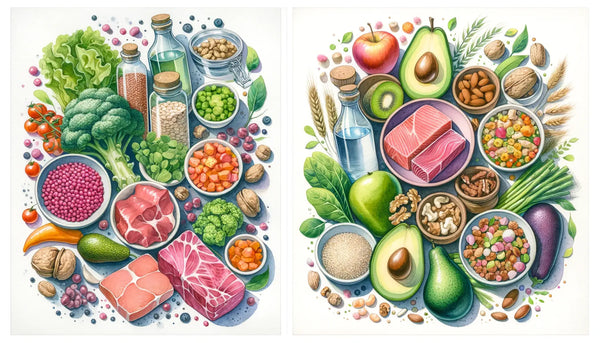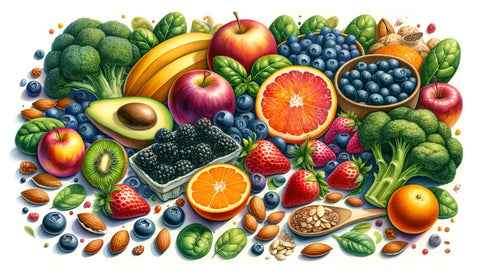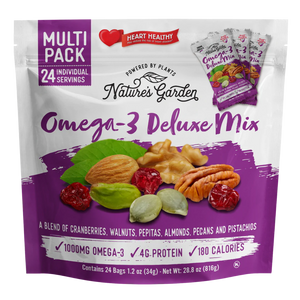We all desire radiant, healthy skin. As our biggest organ, our skin serves as a barometer for overall health and wellness. Glowing, healthy skin is not just about what you apply externally, but also how you nourish your body internally. Dermatologists often inquire about our eating habits during consultations because scientific literature suggests a crucial link between nutrition and skin health. In this guide, we will explore this intricate relationship between nutrition and skin health, important vitamins, and nutrients to focus on in our quest for healthy skin, from the inside out.
Does Nutrition Affect Skin Health?
The foods we consume play a pivotal role in the overall well-being of our skin. Proper nutrition can provide essential nutrients that strengthen the skin’s metabolism and antioxidant activity. Conversely, an imbalanced diet, characterized by excessive processed food and sugar without adequate proteins and healthy fats, can hinder collagen production, leading to decreased skin elasticity and premature aging.
Can Poor Nutrition Cause Skin Problems?
Deficiencies in essential nutrients like protein, fatty acids- vitamins like niacin and minerals like zinc have been linked to various inflammatory skin conditions, including dermatitis. Inflammation within the body often manifests as skin issues that include redness, acne, and accelerated aging.
What is the Role of Collagen in Skin Health?
Collagen serves as the skin’s structural framework, providing elasticity, strength, and moisture. Maintaining healthy collagen production is crucial for healthy skin. As collagen degrades over time, fine lines, wrinkles, and loss of elasticity may become more pronounced. Here are some foods that are shown to boost collagen production.
- Fatty Fish: Salmon, mackerel, and trout are rich in omega-3 fatty acids, which help keep the skin moisturized and support collagen production.
- Berries: Blueberries, strawberries, and raspberries are packed with antioxidants, including vitamin C, which is essential for collagen synthesis.
- Dark Green Leafy Vegetables: Spinach, kale, and Swiss chard contain vitamin C and chlorophyll, which protect the skin and promote collagen formation.
- Nuts and Seeds: Almonds, Walnuts, and Sunflower seeds are high in vitamin E, an antioxidant that preserves collagen and promotes skin health.
- Bone Broth: Bone broth contains collagen and other beneficial compounds that can support your body's collagen production when consumed regularly.
Can Gut Health Impact Skin Appearance?
Emerging research suggests a strong connection between gut microbiome balance and skin health. Probiotic-rich foods like kimchi and yogurt promote gut health, potentially benefiting the skin’s overall condition.
What Are Key Nutrients and Vitamins Essential for Promoting Healthy Skin?
Several nutrients, vitamins and minerals are vital for skin health:
- Omega-3 Fatty Acids: Found in fatty fish like salmon and walnuts, these fats keep the skin moisturized, supple, and thick, preventing dryness and flakiness.
- Vitamin E: Abundant in nuts and seeds, and avocadoes, vitamin E acts as a potent antioxidant, protecting the skin from free radicals and inflammation. It is more effective when combined with Vitamin C, which is instrumental for collagen production.
- Vitamin C: Protects your skin against oxidative damage that is most notable due to the sun and environmental pollution, in addition to being a crucial player in our immune system function. Found in greens and citrus fruit in addition to avocadoes - where a serving contains approximately 14% of the Daily Value for both Vitamin E and 11% of the Daily Value for Vitamin C.
- Zinc: This mineral regulates inflammation and aids in the production of new skin cells. Zinc-rich foods include nuts, seeds, whole grains, and legumes. For example, one ounce of walnuts contains 8% of the Daily Value for zinc.
Balancing Snacks with Protein, Fat and Fiber

Antioxidants for Better Skin Health
Including antioxidants in your diet is the simplest way to enhance your skin health. Fruits, vegetables, nuts, and seeds are rich in antioxidants, providing your body with the necessary building blocks for healthy skin. Smart snacking, especially during prolonged periods between meals, means that we are getting essential vitamins and nutrients to support healthy looking radiant skin, from the inside out.

For those snacking moments that satisfy your cravings and support your well-being, consider Nature’s Garden’s Omega-3 Deluxe Mix -packed with antioxidants and omega-3’s in delicious harmony.
Achieving radiant, healthy skin is not just about creams and beauty products; it starts with what you consume. Your skin reflects your internal well-being and nourishing it from the inside out is key to unlocking its full potential. By making informed dietary choices and focusing on foods rich in essential nutrients and vitamins, you can enjoy skin that truly glows. Remember, it's the small, consistent steps that lead to lasting change. So, embrace the power of nutrition and embark on a journey to healthier, more radiant skin.

